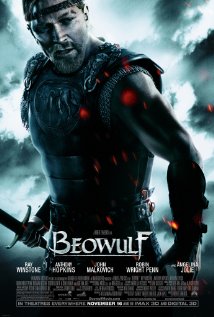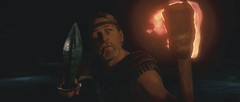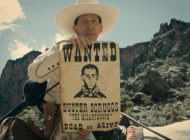Audio Exploration of BEOWULF’s Boasts…
“The time of heroes is dead: the Christ god has killed it, leaving nothing but weeping martyrs and fear and shame.”
 The tale of Beowulf in 2007 differs greatly from the epic, ancient Anglo-Saxon poem. What of Beowulf’s claim in the film? What of Director Robert Zemekis’ boast that his version of the tale has ‘‘nothing to do with the Beowulf you were forced to read in junior high — it’s all about eating, drinking, killing, and fornicating.” If this is true, what does the tale inform us about where that leads?
The tale of Beowulf in 2007 differs greatly from the epic, ancient Anglo-Saxon poem. What of Beowulf’s claim in the film? What of Director Robert Zemekis’ boast that his version of the tale has ‘‘nothing to do with the Beowulf you were forced to read in junior high — it’s all about eating, drinking, killing, and fornicating.” If this is true, what does the tale inform us about where that leads?
The original story of Beowulf is about a hero, the classic heroic myth: the foundation for Arthurian legends, Lord of the Rings and even Star Wars (according to co-writer Robert Avary). Originally written between the 7th and 12th century by monks, modern writers Neil Gaiman and Avary assumed the Monks imposed some of their own spin on it. Thus, they felt the liberty to “liberate” Beowulf from his “purer” version. In this revision, even Beowulf asks the queen to remember him “not as a hero, but as a man, fallible and flawed”.
Their “subtle” alteration doesn’t just add or tweak the tale, it BECOMES the tale. They have changed it in the most significant way POSSIBLE… and I’m fine it. King Hrothgar boasts that “the gods will do nothing for us that we will not do for ourselves – what we need is a HERO!” Along comes the alleged hero, boasting “Mine is strength, and lust, and power! I am Beowulf!!!” Boasting, temptation, and tragedy feature largely in the audio exploration of Beowulf I was able to offer at our Seattle-based “Film and Theology” event.
James 3 says “So also the tongue is a small member, yet it boasts of great things. But if you have bitter jealousy and selfish ambition in your hearts, do not boast and be false to the truth. This is not the wisdom that comes down from above, but is earthly, unspiritual, demonic.” Considering Beowulf’s dealings with the demon in this adaptation o the story, this verse rings with fresh truth in 3D imaging. The following examination of the film runs just under 30 minutes.
 For those who don’t sample the audio, I’ll share a few thoughts… The demoness who tempts Beowulf asserts “Are you the one they call Beowulf? Such a strong man you are. A man like you could own the greatest tale ever sung. Beowulf… Stay with me. Give me a son, and I shall make you the greatest king that ever lived. This… I swear…”
For those who don’t sample the audio, I’ll share a few thoughts… The demoness who tempts Beowulf asserts “Are you the one they call Beowulf? Such a strong man you are. A man like you could own the greatest tale ever sung. Beowulf… Stay with me. Give me a son, and I shall make you the greatest king that ever lived. This… I swear…”
Matthew 16 reminds us “what will it profit a man if he gains the whole world and forfeits his soul? Or what shall a man give in return for his soul?”
This Beowulf makes the same mistake as Hrothgar… not to mention the same mistake as Macbeth… and it leads to his destruction, as well as others. We even see biblical parallels in Samson, King David, and Solomon. Beowulf’s final nemesis wisely asserts “You’re empty. You’re nothing. Even with all your riches, your power, your glory, your women… you’re NOTHING.” Beowulf knows it’s true. His self-centered life has brought him low, his weary face bearing the scowl of an Ecclesiastes lament.
 Here’s why I LIKE what Avary, Zemeckis have wrought… they think they made Beowulf more “REAL”, whereas the monks made him too much of a “boy scout”… but whether that’s true or not, they’ve inadvertently given us a biblical view of man. If Beowulf had fought his battles, given himself to women and demons, done all this and then won back the heart of his queen and said “pass the mead!” with a hearty “huzzah!” then we’d have a great godless view of a hero that Robert Zemeckis (and most men) would love to emulate. Instead, we have – regret, loveless marriage, unreconciled relationships with a son he never knew… death for his people, and a dienchanted man who is able to rectify but a portion of his mistakes. He doesn’t die with any achievement – not even squared or breaking even. He dies in the negative.
Here’s why I LIKE what Avary, Zemeckis have wrought… they think they made Beowulf more “REAL”, whereas the monks made him too much of a “boy scout”… but whether that’s true or not, they’ve inadvertently given us a biblical view of man. If Beowulf had fought his battles, given himself to women and demons, done all this and then won back the heart of his queen and said “pass the mead!” with a hearty “huzzah!” then we’d have a great godless view of a hero that Robert Zemeckis (and most men) would love to emulate. Instead, we have – regret, loveless marriage, unreconciled relationships with a son he never knew… death for his people, and a dienchanted man who is able to rectify but a portion of his mistakes. He doesn’t die with any achievement – not even squared or breaking even. He dies in the negative.
2 Cor 10:17-18 “Let the one who boasts, boast in the Lord. For it is not the one who commends himself who is approved, but the one whom the Lord commends.”
We all have sins like Beowulf, and we all want glory like Beowulf… but all men wither like the grass, their glories fade like flowers in the field. THAT’s what makes the Bible different… there are stories of men that come and go, that do glorious things and grievous things… but only ONE hero throughout the WHOLE narrative. GOD, Jesus Christ, the author and hero of OUR STORY. I pray we bend our knees humbly, for he will humble us; if we don’t bend, he will BEND OUR KNEES FOR US.
He can redeem us from the grave… because all power AND glory are his.
Podcast: Play in new window | Download
Subscribe: Apple Podcasts | RSS



Simply wish to say your article is as surprising. The clearness to your publish
is just spectacular and that i could assume you are
an expert in this subject. Fine together with your permission allow me to clutch
your RSS feed to stay up to date with impending post. Thanks a million
and please carry on the enjoyable work.